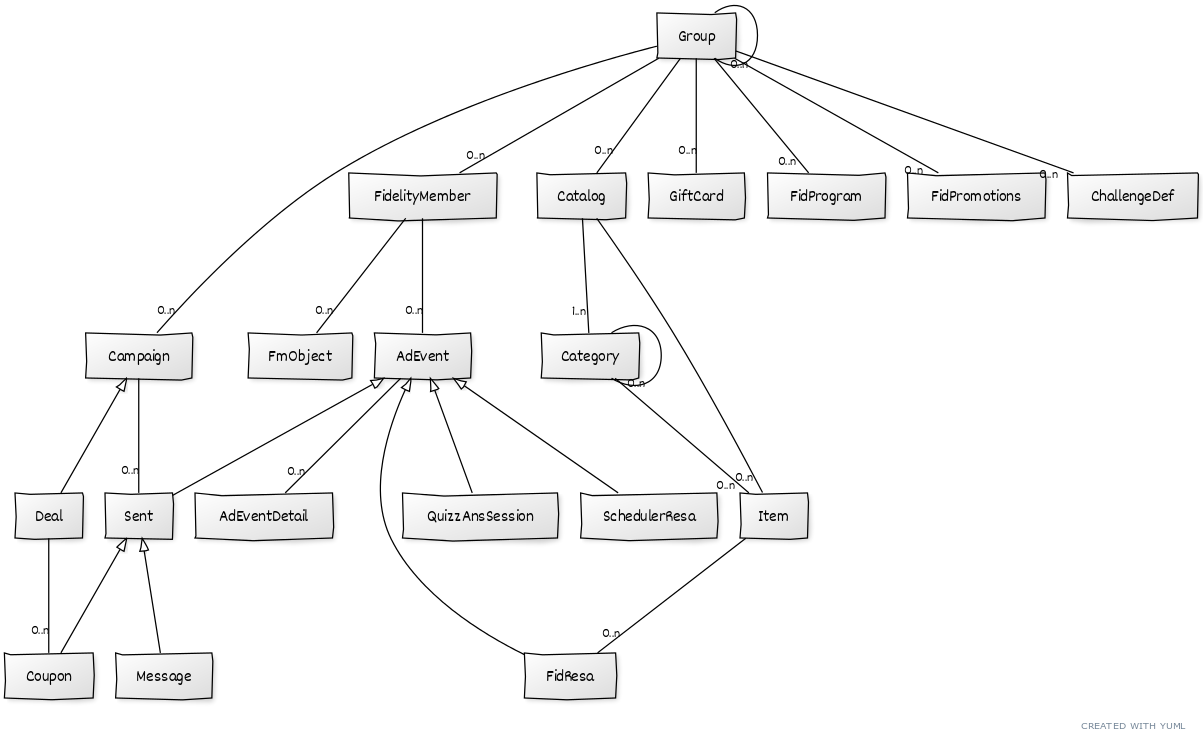Adelya Object Reference
Objects, Operators and Error codes
Objects
Operators
For non exact queries see :Operators
Error Codes
List of most common error codes :Error codes
Some diagrams...
...worth a thousand words

Formats, norms, encoding
Please note that due to compatibility requirement with previous version, we slightly transgress the common REST rules on 2 points : 1/ GET and POST are equivalent (both retrieve the data), 2/ the URL is always the same for any object type and id is part of the posted data.
POST/PUT/DELETE BODY Encoding : Post body is intended to be as-if posted by an HTML form, so a Content-Type of : application/x-www-form-urlencoded is expected. If this is not respected decoding parameters may fail
Otherwise stated, everything should be encoded in UTF-8
default length for AlphaNumeric data fields is 127 characters
Country code follow the ISO 3166 (2 letters, e.g. : FR)
Languages code follow the ISO 639-1 (2 letters, e.g. : de for german)
Phone numbers follow the E.164
Dates :
- Dates returned follow the ISO 9075 in the CEST timezone (e.g : '2013-12-25 00:00:00' for 2013 xmas), but you can add the parameter
dateformat=iso8601to change them to iso8601 extended. - Dates in API call can be either ISO 9075 (in CEST TZ) or ISO 8601 extended with or without ms (e.g. '2020-11-30T15:31:00-06:00' or '2020-11-30T15:31.000:00-06:00' or '2020-11-30T21:31.000:00Z')
-
Dates in API are different from datetime. In general, validity periods on our objects are from date format and are set on our side
- Start date : set to start of the date's day (00:00:00)
- End date : set to end of the date's day (23:59:59)
- If a datetime is provided it will be converted to server timezone. If the target field is a date field, it could result some date shifting
- In API return, even a date field is returned as datetime
otherwise stated, data retrieval is case insensitive. (e.g. searching for member firstname 'john' or 'John' will returned the same set of data)
Pagination
There is limit to the amount of data returned by list. As for now 100 entries is the limit
It is possible to limit the number of results given by the research to a smaller number or use "pages" to retrieve more data
To do this you can use the following parameters:
- LIMITOFFSET: Shift of the first result returned (default value: 0)
- LIMITROWCOUNT: Max result number returned (default value: 0, limit: 100)
- ORDERBY: Fields separated by commas (default value: ""). Add "asc" or "desc" after fields to set list order (separated by a space)
GET /apiv1/webapi.do?json_data={ CompactFidelityMember:{ actif : "1" } }&LIMITOFFSET=101&LIMITROWCOUNT=10&ORDERBY=id desc
COUNT : To know the resultset size : proceed as for a search, but add the parameter action=count to your request (see faq for an example).
Return data subset
The quantity of data returned can be overwhelming. You can use the fields parameter to specify the fields of the main object to be returned
This work for single or list returned data.
GET /apiv1/webapi.do?json_data={CompactFidelityMember:{actif:"1"}}&fields=name,firstname,mobile
note : Apiv2 (in Alpha status) use graphQL to achieve a more complete result
Return the persisted object
When you persist an event or a member the business rules are run and may modified the object itself.
It is quite common to want to have a look at the modified data (e.g. for synchronization purpose).
Of course you can chain a PUT and a GET,
but we provide a shortcut, to limitate the number of interactions.
add the returnType=show parameter to your url.
You will have a data node part of the response containing the object data.
Please notice that due to the inherent nature of data replication between write and read databases, you will experience a delay between the availability of the newly PUT data on a GET request, even if we do our best effort to keep it as low as possible, and it is usually not over 1s.
PUT /apiv1/webapi.do?json_data={FidelityMember:{actif:"1",name:"dujardin"}}&returnType=show
return :
{
"ApiReturn":{
"code":"OK",
"message":"Everything went ok !",
"data":{
"FidelityMember":{
"id":"11299822",
"dateUpdate":"2019-07-30 16:02:43",
"idExternals":"",
"defaultLanguage":"",
"type":"C",
"src":"C",
"name":"DUJARDIN",
...
}
},
"id":"11299822"
}
}
note : returnType and fields parameters cannot be combined
note : it will only add up to 10 new group to the cache with each request
Translations
Some entities are translatables. Translatables entities :
- Group
- Catalog
- Item
- Category
API access to translations only work for single entity.
Return object translations
You can use the locale parameter to specify the target translation to be returned. locale can take 3 kinds of values :
<empty>: get pure object, without specific translation*: get all specified translations insidetranslationListnode<LOCAL>: get the native object with translated fields
GET /apiv1/webapi.do?json_data={Catalog:{uniqueId:"6587dea8-7681-11e7-86fa-4a49434984bf"}}&fields=descr&locale=en
return :
{
"Catalog":{
"id":11969,
"descr":"TestCache US"
}
}
GET /apiv1/webapi.do?json_data={Catalog:{uniqueId:"6587dea8-7681-11e7-86fa-4a49434984bf"}}&fields=descr&locale=*
return :
{
"Catalog":{
"id":11969,
"descr":"TestCache",
"translationList":{
"descr":{
"fr":"TestCache FR",
"en":"TestCache US"
}
}
}
}
Set object translations
Each translatable fields can be specified in the translationList node, with the tagret <LOCALE> (as sub-node) for this translation.
{
"Catalog":{
"id":11969,
"descr":"TestCache FRance",
"translationList":{
"descr":{
"fr":"TestCache FR",
"es":"TestCache ES"
}
}
}
}
Return
{
"ApiReturn":{
"code":"OK",
"message":"",
"id":"11969"
}
}